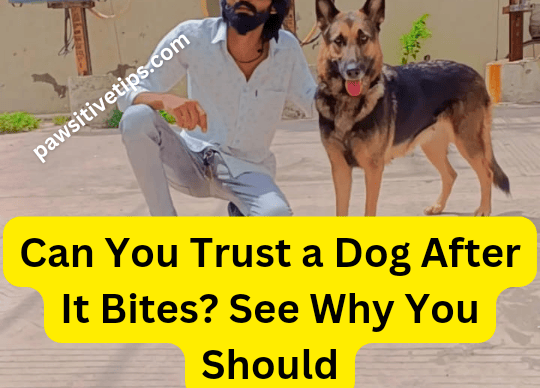Can you trust a dog after it bites? (2024)

As a dog owner and someone who loves going out for a walk with my dog, I have always noticed that the bond between humans and dogs is a special one, rooted in companionship, loyalty, and shared experiences.
However, what happens when this bond is tested by a dog bite? The question arises: Can you trust a dog after it bites? The answer is not always clear-cut. This is because there are many factors to consider, including the circumstances of the bite, the dog’s breed and history, and your own personal comfort level.
In today’s article, we’ll delve into the intricacies of canine behavior, examine the reasons behind dog bites, and look at effective strategies for rebuilding trust between dog owners and their dogs after a bite.
Can you trust a dog after it bites?
Like I said in the introduction, the answer to whether or not you can trust your dog again after biting you or someone else is not actually a straight-forward one. There are many factors at play here that can determine whether you can still trust your dog around people again or not.
Personally, it will be hard (if at all I can) for me to trust my dog again after it bites me or someone else, but that doesn’t mean that there are no people who can still trust their dogs after biting someone.
So truthfully, it is possible to trust a dog after it bites if the bite was not serious and if the dog has no history of aggression. However, it is important to take steps to reduce the risk of the dog biting again. This may include working with a qualified dog trainer, providing the dog with plenty of exercise, and avoiding situations that could trigger the dog’s aggression.
If the bite was serious or if the dog has a history of aggression, it may be more difficult to trust the dog again. In these cases, it is important to seek professional advice from a veterinarian, a dog trainer, or a behaviorist. They can help you assess the situation and develop a plan for managing the dog’s aggression.
What to consider when deciding whether to trust a dog after it bites
To determine whether a dog can be trusted after biting you or someone else, it’s very important to delve into the circumstances surrounding the incident and assess the dog’s behavior, history, and environment. But before then, check out the punishment you’ll get if your dog bites someone.
Now, here are the factors to consider when deciding whether to trust a dog after it bites:
The circumstances of the bite
Before ever considering whether to trust your dog again after it bites or not, you seriously try as much as you can to understand why the dog bit in the first place. Was the dog provoked? Was it in pain? Was it protecting itself? A careful analysis of the circumstances of the bite can actually give you clues about whether the dog is likely to bite again.
The dog’s breed and history
Do you know that some breeds of dogs are more likely to bite than others? Based on my experience, there was a day my mom got bitten by one of my German Shepherds in my kennels.
Although I have always known that German Shepherds and Pitbulls have this unhealthy, aggressive temperament but I didn’t know it would come to the point of biting one of the hands that feeds them.
After that minor incident, I sold off that particular dog because I found it difficult to trust the dog around people.
I need you to understand that any dog can bite, regardless of breed. Which is why I advise you to consider the dog’s individual history before buying, adopting, or taking yours for a walk in public places. If the dog has a history of biting, it’s more likely to bite again.
The dog’s age and temperament
Younger dogs are more likely to bite than older dogs. This is because they are still learning how to interact with the world and may not have yet learned how to control their aggression. Dogs with a fearful or anxious temperament are also more likely to bite.
The owner’s behavior
The owner’s behavior can also play a role in a dog’s biting. If the owner is aggressive or neglectful, the dog may learn to be aggressive as well.
The dog’s training and socialization
Dogs that have not been properly trained or socialized are more likely to bite. This is because they do not know how to interact with other people and animals in a safe and appropriate way.
The dog’s health
Another factor to consider when deciding whether to trust your dog after it bites you or someone else is the general health status of the dog. If a dog is in pain or sick, it may be more likely to bite. This is because the pain or illness can make the dog feel threatened or insecure.
Related articles:
- Can You Fly With 2 Small Dogs In One Carrier? ( Basic Facts)
- Are Brindle dogs Aggressive? Why Are They Unpopular?
- Why Does My Dog Huff at Me? (7 Shocking Reasons)
How do you build trust with a dog after biting?
Even if your dog bit someone or you, don’t let it get to you; don’t punish the dog; rather, you should strive to rebuild trust with your furry friend. So for that reason, I am going to give you some tips on how you can build trust with a dog after biting:
- Be patient and understanding: It may take time for your dog to learn to trust you again.
- Build better communication skills with your dog: This means learning to read your dog’s body language and responding to their needs in a way that is calm and reassuring.
- Work with a professional dog trainer or animal behaviorist: They can help you identify the triggers for your dog’s aggression and develop a plan for managing it.
- Always approach a dog that’s bitten with caution: Even if you think your dog is no longer a threat, it’s important to be careful.
- Supervise your dog around children and other animals: Never leave your dog unsupervised with children or other animals.
Remember, any dog will bite under the right circumstances. It’s up to you to learn how to read your dog’s body language and avoid a situation that puts you or others at risk.
I think I have been able to answer the question, “Can you trust a dog after it bites?” Now, what will you do if your dog bites you or someone else? I will love to read your reply in the comment section.


